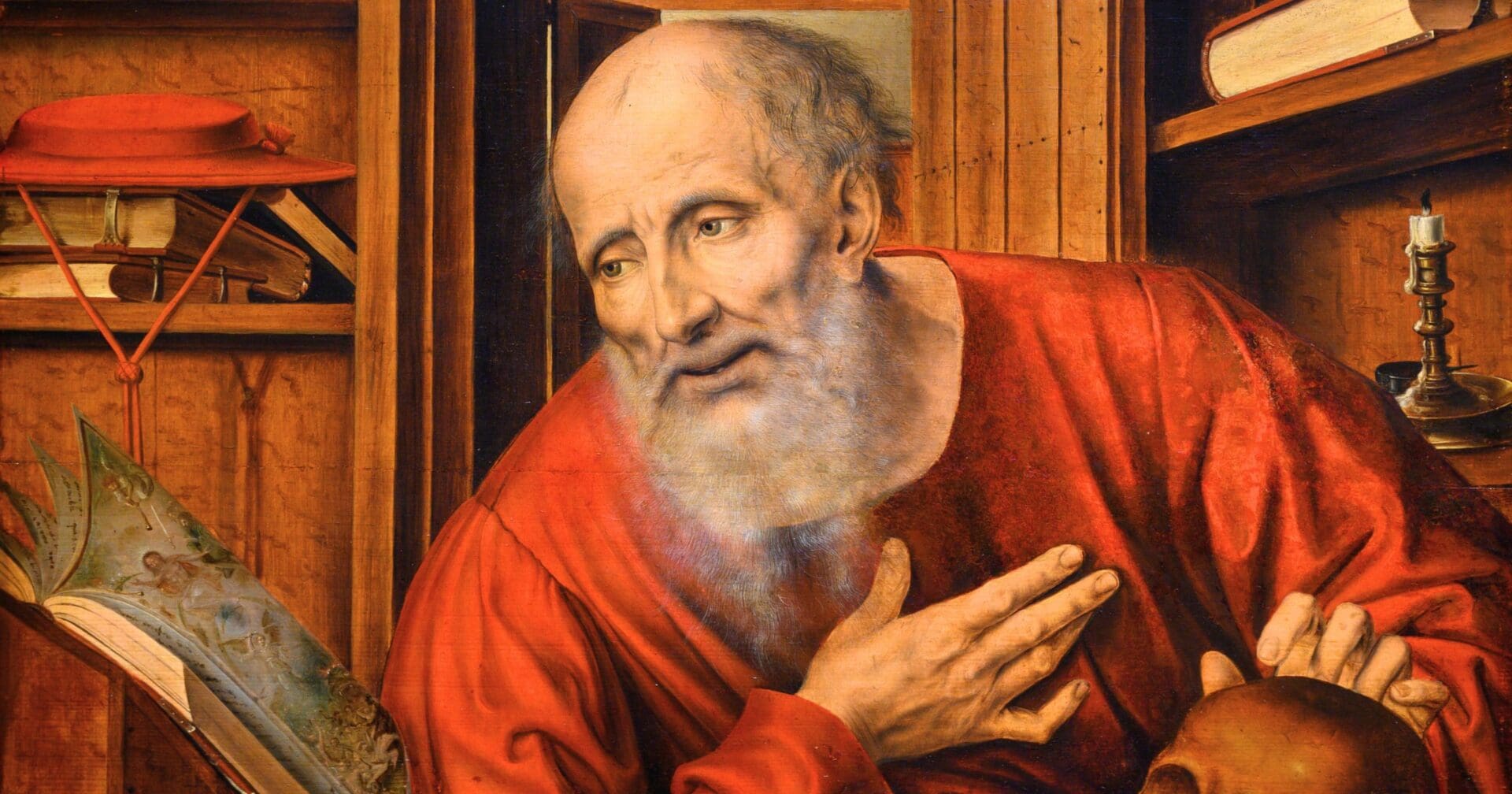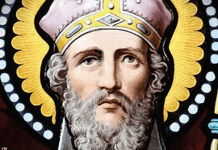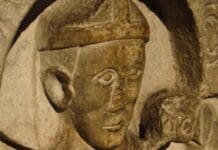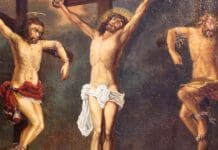Saint Jerome, born Eusebius Hieronymus around 347, remains an iconic figure in Christian history. A renowned Father and Doctor of the Church, he’s famed for his monumental contribution: translating the Bible into Latin, thus creating the revered Vulgate edition.
Born in Stridon, a region straddling today’s Slovenia and Croatia, Jerome’s affluent Catholic family ensured he received a robust education. As a youth, he journeyed to Rome, immersing himself in classical literature and, marking a spiritual transformation, was baptized at 19. His thirst for knowledge led him to Trier and Aquileia, where he began exploring theology with fellow ascetics.
The East beckoned Jerome around 373. In Antioch, while deepening his humanistic and monastic pursuits, a dream altered his life’s course: Christ criticized him for valuing Cicero over Christianity. Although his commitment to solely focus on theology was sometimes questioned by peers like Rufinus, this dream undeniably redirected his passions. Jerome’s self-imposed exile to the Chalcis desert saw him embrace asceticism and master Hebrew.
After his ordination by Bishop Paulinus in Antioch and spending time under Gregory of Nazianzus’s tutelage in Constantinople, Rome called him back. Pope Damasus I, recognizing his talents, entrusted him with the formidable task of refining the Latin Bible. But following Damasus’s passing, Jerome’s influence waned, prompting his return to the East.
It was in Bethlehem in 386, supported by his devoted patroness Paula, that Jerome’s literary genius truly flourished. Over the next three decades, he crafted insightful biblical commentaries and the significant portions of the Latin Bible, the Vulgate.
Jerome’s legacy is not just in his translations but in his pioneering methods. Blending philology, geography, and archaeology, he set the benchmark for Western biblical exegesis. His vast correspondence, including exchanges with Saint Augustine, unveils the intricacies of his character and times.
While Jerome’s tempestuous nature won him adversaries, his brilliance remains undeniable. His two-decade endeavor, the Vulgate, replaced the disordered older Latin translations, becoming the bedrock of Latin Christianity. Reaffirmed by the Council of Trent in 1546, it is still cherished as the quintessential Latin Bible.
In remembrance of his profound contributions, Saint Jerome is venerated as the patron of numerous vocations, including librarians, archaeologists, and translators, and even the city of Quebec in Canada.


















Just like, doing it, and trying to encourage others, to fellow Jesus in daily way of life,help spreading the good news about Jesus,in daily life, a lot of people said everyday life is boring for them, why can’t we make it interesting for someone that can’t do it for themselves, and they will come along, and start to live on their own daily life, before it’s too late for some.
A highly organized and detail oriented Remote Data Entry Assistant is needed at our company to work with our team of professionals to collect. analyze and input Data into our online systems and Social Media platforms. sy This is a remote position and full-time or Half-time job.
For Apply Click…….. Regular Payouts
Please pray for me I am experiencing all sort of difficulties even with the website I use. The family also for unity and love, so far our need to get Nancy to agree to the sale of 63 Cranbrook PARK has been futile, she is determined it seems not to accept the terms o the agreement she made with our late son and it is causing us must distree. Pleas help us pray for
this situation. Thank you.
It’s good to see someone thnnikig it through.
Hi there,I log on to your blog named “Saint Jerome” like every week.Your writing style is awesome, keep up the good work! And you can look our website about proxy free list.
Ecce Crucem Domini!
Fugite partes adversae!
Vicit Leo de tribu Juda,
Radix David! Alleluia!
Saints Jerome, Paul, John the Baptist, Jean-Baptiste-Marie Vianney, Louis-Marie de Montfort, Gemma Galgani, pray for us.
St. Jerome, pray for us.
Santo.
[…] post Saint Jerome appeared first on […]
St. Jerome pray for us..
O Lord, show Your mercy to me and gladden my heart. I am like the man on the way to Jericho who was overtaken by robbers, wounded and left for dead. O Good Samaritan, come to my aid. I am like the sheep that went astray. O Good Shepherd, seek me out and bring me home in accord with Your will. Let me dwell in Your house all the days of my life and praise You for ever and ever with those who are there. Amen.
Saints Jerome, Paul, Augustine, pray for us. Especially for those named Paula and Paul. Let them accept the knowledge that God exists, tat we have all been born to know Him, love Him, serve Him, in this life and to be happy with Him in the next, as the old Baltimore Catechism highlights for all of the Faithful. So many have lost faith and hope, which renders charity vacuous. Thanks be to God for this holy wealthy woman named Paula, who provided Saint Jerome with safety and seclusion and time to create the Vulgate for the Latin Church. 23 of those 34 years spent in studious prayer, self-discipline, and accomplishment. Astonishing! Saint Jerome, restore Quebec City to the Canadian powerhouse of Catholicism it once was. Bring urgent permanent conversion of sinners and unbelievers through biblical and personal connections to Christ Crucified. Amen.
St. Jerome, pray for us.
Saint Jerome pray for us amen
A highly organized and detail oriented Remote Data Entry Assistant is needed at our company to work with our team of professionals to collect. analyze and input Data into our online systems and Social Media platforms. su This is a remote position and full-time or Half-time job.
For Apply Click…….. Regular Payouts